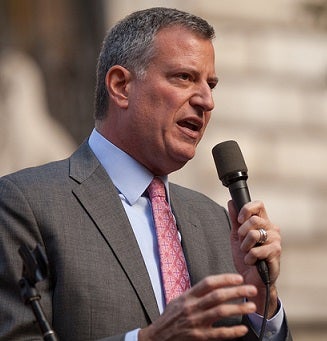NYC Mayor Launches Energy Efficiency Program Modeled After NYC Clean Heat

Over the weekend, New York City Mayor de Blasio unveiled an ambitious plan to address energy use in the city’s buildings, called NYC Built to Last. Through this plan, NYC is committing to reduce its emissions by 80 percent below 2005 levels by 2050. This makes NYC the largest city in the world to commit to a goal like this. Representing three quarters of the city’s greenhouse gas emissions, New York City buildings must play a central role in any effective climate action plan, and Mayor de Blasio knows this.
A key component of this plan is the ‘retrofit accelerator,’ a program modeled on the successful NYC Clean Heat program. Retrofit accelerator aims to upgrade 20,000 private buildings, making up 15 percent of citywide built square footage. Of these buildings, 40 percent of them will be low-income housing.
EDF partnered with the City to create NYC Clean Heat, which forged a diverse coalition of financial, real estate, and non-profit communities to launch a $100 million financing program to help phase out dirty heating oils. Last week, the City announced the program met its goal of reducing soot pollution from heating oil in NYC by 50 percent. The program helped 4,000 buildings – half of them affordable housing – convert to cleaner, more efficient heating fuels.
The mayor’s retrofit accelerator program is an exciting expansion of the successful NYC Clean Heat model and could help thousands of buildings in the city invest in energy efficiency. The City is leading by example by performing energy efficiency upgrades on every single public building in the city by 2025. Overall, improved energy efficiency will reduce the burden of high energy bills on the city’s low-income residents, improve air quality while reducing emissions, and spur green collar jobs city-wide.
With New York City buildings planning to switch on heaters Oct. 1 for the colder months, energy is on the mind of every building owner and manager in the city. The mayor’s retrofit accelerator program will help private building owners and managers make choices that save them money, improve the way their buildings run, and contribute to the health of all New Yorkers. EDF looks forward to working with the mayor and the City to accomplish these important and necessary goals.










